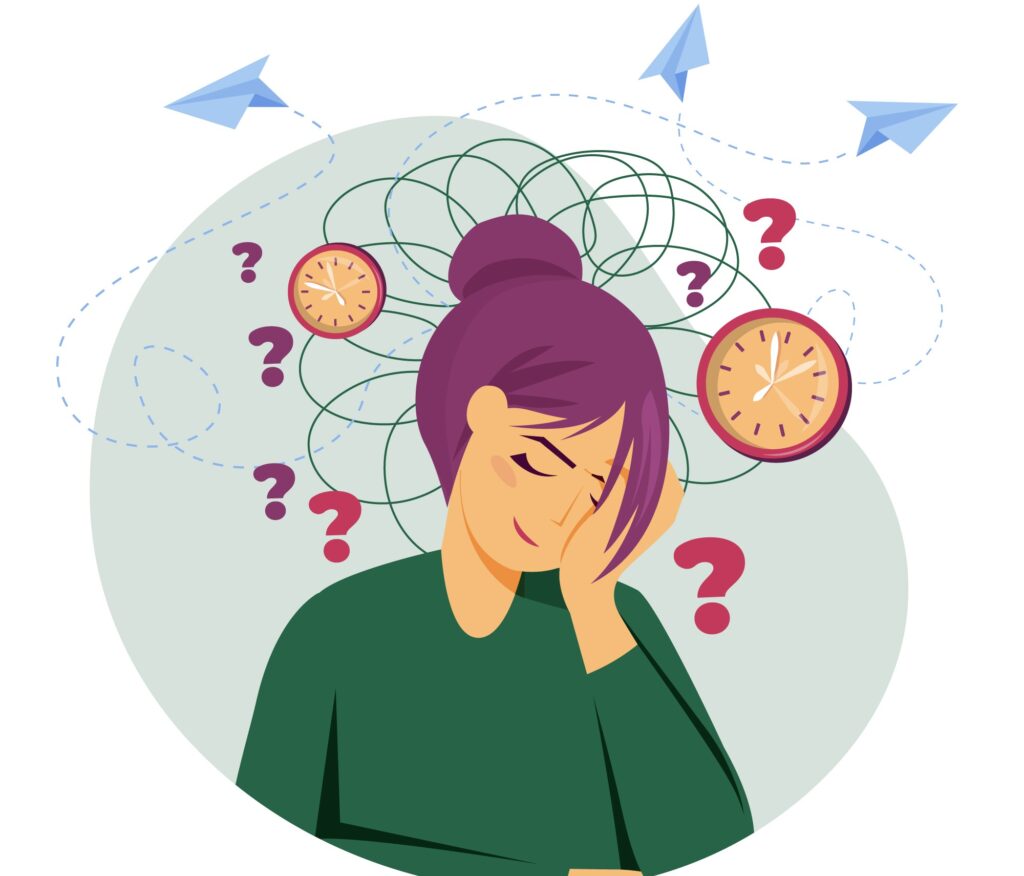Overview of the Impact of Intrusive Thoughts and Compulsions
Persistent and unwelcome thoughts, images, or urges that trigger anxiety or distress are what we refer to as intrusive thoughts. These thoughts typically revolve around issues like cleanliness, self-harm, or concern for safety. On the other hand, compulsions are repetitive actions or thoughts that those with OCD feel pressured to carry out in reaction to these intrusive thoughts. These rituals may involve behaviors such as repeated hand-washing, checking, counting, or praying. In OCD, intrusive thoughts and compulsions can have a deep impact, influencing many parts of a person’s life. It’s common to feel anxious and upset, which can make it hard to do everyday things like work, connect with others, and enjoy life. Dealing with constant intrusive thoughts can be tiring, causing a lot of emotional stress and making it tough to focus or take part in activities.
Coping Strategies For Intrusive Thoughts & Compulsions
Everyone has thoughts that pop into their head sometimes, but for people with OCD, these thoughts can happen a lot and make it hard for them to do things. These thoughts can be about different things, like hurting themselves or other scary things. They can last for a long time and make it hard for people to feel happy and do things they want to do. There isn’t a cure for OCD, but there are ways to help managing OCD symptoms with therapy. Consider these following coping strategies for intrusive thoughts.
Cognitive Restructuring
When it come to managing OCD symptoms with therapy, we at first talk about CBT (cognitive-behavioral therapy). This method involves working closely with a therapist to uncover and question unrealistic or troubling thoughts, changing how a person sees their worries, and lessening their effect. By actively tackling and reshaping negative thinking habits, people can form more positive and sensible perspectives on their intrusive thoughts, helping to ease the related feelings of unease. This approach focuses on helping individuals spot and adjust common mistaken beliefs linked to OCD, which can lead to less frequent and intense intrusive thoughts and compulsions.
Exposure and Response Prevention (ERP) Therapy
ERP is a really effective coping strategy for intrusive thoughts and compulsions in OCD, helping people deal with their fears slowly. It involves facing fears slowly by exposing yourself to things that make you anxious, while resisting the urge to do things that usually calm you down. Over time, this helps you face your fears and rely less on compulsive behaviors, making your anxiety and intrusive thoughts lessen. ERP works on the idea that by facing your fears over and over again without giving in to compulsions, your brain learns to see these fears as less scary, which helps reduce the need for compulsive actions.
Mindfulness Meditation Practices

Mindfulness meditation is all about being present and aware without judging. When it comes to dealing with unwanted thoughts and habits in OCD, one tharepy has always been on 3 rd spot for best medication options for OCD treatment and that is mindfulness meditation which can help you develop a calm and understanding mindset towards your thoughts. By simply observing your thoughts without getting overwhelmed, you can create some space between yourself and those intrusive thoughts, making them less distressing. Mindfulness practices can also help you become more in tune with your emotions and better at managing them, making it easier to handle intrusive thoughts in your daily life.
Acceptance and Commitment Therapy (ACT)
ACT is a therapeutic approach that helps people in accepting their thoughts and emotions without trying to push them away. Managing OCD symptoms with therapy, specifically in dealing with OCD, ACT urges individuals to welcome their intrusive thoughts without resorting to rituals or avoiding them. The focus shifts towards aligning actions with one’s own values and dreams, regardless of those pesky thoughts. By promoting flexibility in how we think and a readiness to face discomfort, ACT aims to decrease the impact of intrusive thoughts and compulsive behaviors on our daily lives, ultimately leading to a better sense of happiness and well-being.
Cultivating Non-Judgmental Awareness of Thoughts
In dealing with unwanted thoughts and behaviors in OCD, it’s important to practice being open-minded and observant without passing harsh judgment. By staying present and not letting these thoughts trigger distress, you can create a healthier relationship with your mind. Remember, thoughts come and go—they don’t define who you are or demand immediate action. This mindful attitude can help you distance yourself from intrusive thoughts, making them less overwhelming and reducing the urge to engage in compulsive actions. Embracing this non-judgmental mindset allows for a more peaceful coexistence with your thoughts, ultimately easing the burden of OCD symptoms.
Establishing Regular Exercise Routine

According to the top TMS treatment doctors for OCD, says that establishing a regular exercise routine has been linked to lower stress levels, decreased anxiety, and fewer depressive feelings, which are often connected to OCD. In addition to medication options for OCD treatment, Working out is a positive way to deal with stress and anxiety caused by unwanted thoughts, giving people a healthy way to handle these emotions. Moreover, when you exercise, your body releases feel-good hormones called endorphins, which can boost your mood and overall happiness. This could help reduce the influence of intrusive thoughts on your everyday life.
Learn how exercise can be an effective tool in managing OCD by reading our latest blog: The Role of Exercise in Managing OCD
Prioritizing Adequate Sleep and Stress Management
As a part of your lifestyle changes for OCD management, adequate sleep is crucial. When your sleep schedule gets messed up and you feel extra stressed out, it can make your OCD symptoms worse. That’s why it’s really important for you to create good bedtime habits and find ways to manage stress in your daily life. Getting enough sleep helps your brain work better and makes it easier for you to handle your emotions, which could mean those pesky thoughts bother you less often. Plus, practicing relaxation techniques like taking deep breaths, slowly tensing and relaxing your muscles, and staying present in the moment can help you control how you react to those intrusive thoughts. This can lower your overall anxiety levels and reduce the urge to give in to your compulsions.
Dietary Changes to Support Mental Health

Changing your diet can help when dealing with symptoms of OCD like intrusive thoughts and compulsions. While just changing what you eat might not directly fix OCD, having a balanced and nutritious diet can make you feel better overall and maybe even improve your mood and thinking. Some people find that certain foods like caffeine and sugary snacks can make their anxiety and stress worse, which could make intrusive thoughts more frequent and intense. Eating plenty of whole foods, healthy fats, and nutrients can help support your mental health and help you deal better with OCD symptoms.
Navigating intrusive thoughts and compulsions associated with OCD can be a challenge, but with the right strategies and support, it is possible to manage them effectively. Remember, seeking professional help from the experts at the RNR Medicine Department at Jaslok Hospital can provide you with the necessary tools and guidance to take control of your OCD symptoms and lead a more balanced and fulfilling life. Stay committed to your treatment plan, practice self-care, and be patient with yourself as you work towards healing and growth. Your journey to recovery is unique, but you’re never alone in it. Come and visit our TMS treatment clinic for OCD in Mumbai at Jaslok Hospital to regain control and reclaim your mental well-being.

